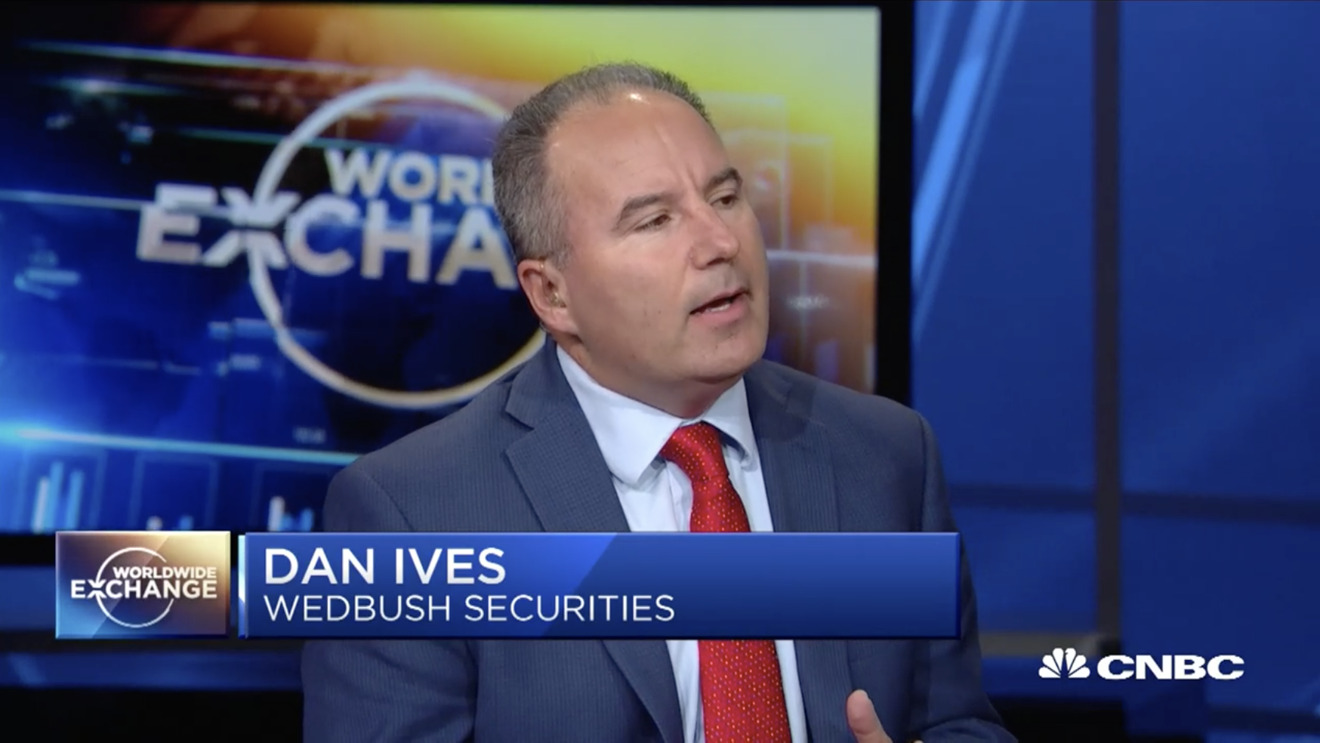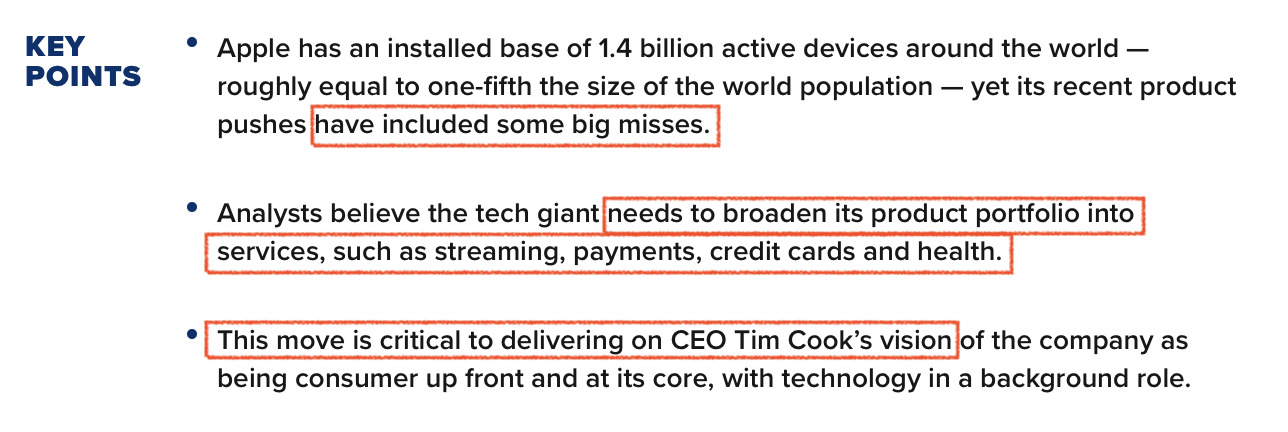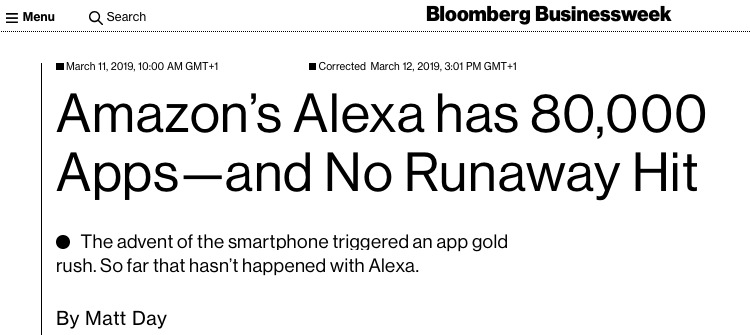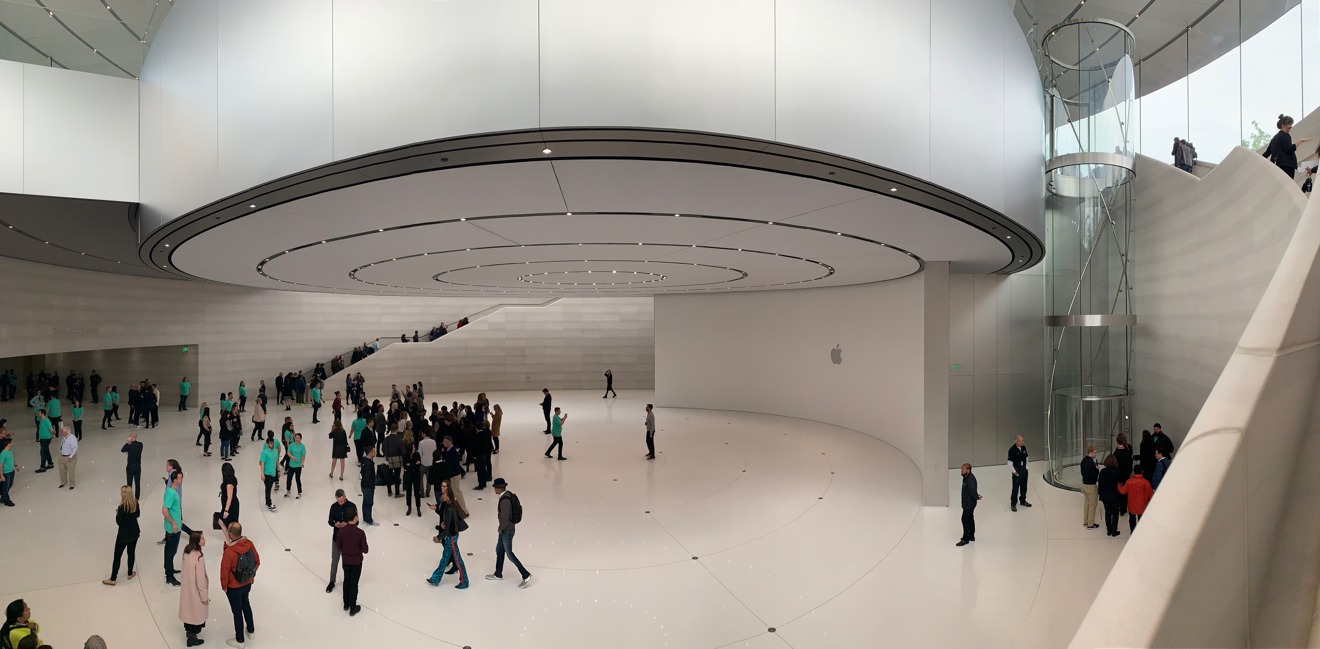On Monday, CNBC compiled the confused thoughts of a Wedbush Securities analyst who doesn't seem to have any grasp on reality whatsoever when it comes to the future — or even present — of Apple.
Writing for CNBC under the headline "Waiting for Apple's next breakthrough device? Here's why you shouldn't," Eric Rosenbaum imagined that Apple is struggling to sell new hardware, announced that "analysts" have stumbled onto the idea that the company could maybe branch out into services — a solid five years after Tim Cook began trumpeting the concept of Services, and then built Services into a $10 billion per quarter enterprise. He then explained that the reason for this is that Apple is getting out of the technology business.
That last one is an astoundingly gag-worthy conclusion based on Rosenbaum's sloppy regurgitation of another idea Cook has spoon-fed to analysts and the media: that Apple isn't in the business of just selling pure technology but rather works to craft complete solutions for its customers. Converting that into the idea that Apple is getting out of tech to become a services company is just astounding, but it's becoming a fashionable media narrative that almost nobody seems embarrassed to recite.
This series of spectacularly obtuse takes presented as "key points" might be excused as an editorial mistake, perhaps the work of a teenage intern trying to boil down the essence of the article into an oversimplified synopsis.
But rather than fleshing out a more nuanced presentation of the state of Apple, the full text of Rosenbaum's article dives further downward into ham-handed simplicity. To be fair, Rosenbaum doesn't seem to have invented his article's "key points" personally. Instead, the missive is largely attributed to Wedbush Securities' managing director Dan Ives.
Apple's "very big misses"
How does one support the laughable claim that Apple's "recent product pushes have included some very big misses"? Ives lazily falls back into the comfortable executive armchair of complaining that "HomePod was a failure," calling it "late to the game and mispriced."
Certainly, if HomePod were cheaper— say if Apple had slashed the price its home speaker the way Sonos often has— it could have sold some additional number of units while earning less money. That's what Sonos did last year: it reported selling 4.6 million units across its entire range of devices, but only brought in about two-thirds of the revenues of Apple's roughly 4 million sales of HomePod.
It would be pretty ignorant to suggest that Apple would have been better off if it had turned in Sonos' results. In Apple's first year of HomePod availability, sales were more commercially successful than Sonos, a well regarded and quite popular home speaker pioneer now in its sixth year of building wireless smart home audio devices. Apple "walked right in" to the premium tier of the market for smart home speakers.
But Ives isn't thinking about Sonos. Instead, he apparently has in mind Amazon Alexa. He called Apple's success and its "huge installed base of users" a "double-edged sword, as it allows the company to ignore the first-to-market mantra in developing new products, which may become a riskier strategy in today's world."
It's dangerous to try to find meaning in casually-tossed trite cliches, but it certainly appears that Ives is trying to say that Apple is in a precariously dangerous position because its success is blinding it to the importance of being the first mover in emerging product categories.
That's clearly the interpretation Rosenbaum makes, as his next paragraph explains that "Amazon has been moving in the opposite direction — branching out from its enterprise market success with cloud services giant Amazon Web Services to the consumer market with Alexa."
Yet there are at least two things that are disastrously wrong here: first, that Amazon's first-to-market status with Alexa is representative of success in any way, and second, that Apple needs to be first in introducing new product categories.
Amazon has dumped tremendous resources into Alexa and related hardware, but simply hasn't delivered any of the objectives it aimed to reach— or that giddy analysts predicted on its behalf, fueling Alexa's initial waves of hype. Voice shopping has simply not materialized, and voice-based Alexa Skills never developed into an important software ecosystem in any way compatible with the App Store. Analysts were simply wrong about Alexa, the same way they were nearly unanimously wrong about Windows Phone.
First-to-market fictions
Amazon is pretty clearly not making money selling mostly $30 Dots— it would have needed to sell around 46 million of them to bring in the same revenue of Apple's HomePod last year. It is obvious to even the most casual user that the device is used to sell more stuff on Amazon and not make money directly. But even its "first mover" status in handing out WiFi mics with voice assistants has been pretty solidly matched by Google's own, very belated hardware WiFi mic giveaways.
And to completely eviscerate this absurd idea that Apple has somehow become too successful to heed the all-important "first to market mantra," anyone who knows anything about Apple is aware that the company isn't a "first mover" in any basic product categories.
Apple is not an invention engine of product categories. It's a refined experience implementor. iPod, iPhone, iPad, Apple Watch, AirPods and HomePod were not the first MP3 players, smartphones, tablets, smartwatches, wireless headphones or smart speakers.
Yet, Apple blazed out entirely new product concepts that advanced beyond clumsy existing designs, adding desirable new features based on the latest technology available, all integrated into an overall experience that feels worthy of a premium price to reasonably affluent users who would rather buy a device that works than spend lots of time trying to figure out a first-attempt product by a company racing to hit the market before their product was ready— say, by focusing on a features like ordering an Uber by voice rather than thinking about privacy and security.
This isn't a difficult concept. HomePod wasn't the first to market, and it is successful. On the other hand, Samsung's Galaxy Fold was indeed first but was not in any way a success. After five years of trying, Amazon's Alexa, while being first and achieving vast unit sales volume and overwhelming market share, is simply not a real commercial success and shows no real signs of blossoming into one.
And certainly, if HomePod is going to be compared against the scale of Apple's 200 million plus annual iPhone sales, then by the same token Amazon Alexa should be held up against the scale of Amazon Web Services and its vast global online sales platform. If analysts are unwilling to do this across the board, they're not analyzing, they are merely crafting slanted propaganda.
"AirPods are nice, AI was a failure"
Ives pretty clearly makes this case when he follows up with "AirPods are nice, but it doesn't move the needle." Rather than factually challenging Ives' claim, Rosenbaum only described Apple's "blowout quarter" for wearables and specifically the "phenomenal demand' for AirPods as being merely the opinions of Apple's chief executive, as if the two men are debating philosophy rather than the objective performance of a public company.
And for good measure, just to establish his credibility in the tech space, Ives also casually threw out "Homepod [sic] was a failure; AI was a failure."
Yes, remember when Apple introduced various implementations of Artificial Intelligence across its platforms and created Machine Learning development tools for its third-party developers that unlocked all kinds of visual, audio, text and semantic processing capabilities? Big fail! Be sure to remember that Wedbush Securities has a managing director that thinks this and isn't ashamed to have it printed as a direct quotation: Artificial Intelligence was a failure.
Apple must be so embarrassed to have installed John Giannandrea as its Senior Vice President of Machine Learning and AI Strategy on an executive level. Are they going to have to pay to get rid of him now? One last time: Dan Ives of Wedbush Securities has announced that "AI was a failure."
I have devoted a lot of my life to responding to some dumb takes by analysts, but I can't remember a single more artificially intelligent comment in my life than to announce that "AI was a failure."
Apple's next play came five years ago
Shockingly, things don't improve in Rosenbaum's article. Laying out "Apple's Next Play," Ives correctly notes the importance of Apple's vast installed base of 1.4 billion active devices, but then acts as if he's been in a coma since 2014, apparently alongside Rosenbaum.
The article summarizes their collective loss of conscious awareness over the five years in stating, "the conundrum has been trying to broaden out the product portfolio into other facets of the consumer lifestyle, Ives said: streaming, wearables, payments, credit cards, and health."
Yes, how exactly does Apple expect to enter Streaming? Or Wearables, or Payments— that sounds particularly tricky for a company that just sells phones. And Credit Cards! Now we are just being ridiculous. And what prospect could Apple possibly have in the area of Health? What, is the company going to start selling wearables that track every step and record your heart rate and maybe perform an EKG?!
Crazily enough, those aren't the biggest challenges! "Ultimately," Ives announced, "the biggest challenge is breaking into the enterprise and non-consumer areas, and that has historically been a bigger challenge, as MSFT owns enterprise."
I hate to sound smart-alecky, but if you're going to regularly make a big deal about how much of Apple's business comes from iPhone, that means you can't also pretend that Apple's position in the enterprise is based on the number of Macs it sells. Apple has had an extremely strong position in the Enterprise built entirely upon its mobile devices, and their clear superiority over Microsoft's various failed initiatives in Mobile ranging from Surface RT to Windows Phone.
This is such a well-known phenomenon that it has coined the phrase BYOD— and it was years before Amazon launched Alexa. Saying that Apple has some difficult road ahead in trying to find its way into the enterprise is about as dumb as saying AI was a failure, or that the company should look into building out some Services offerings.
If only Apple had a distribution platform
As if things couldn't get more poorly thought out, Ive next states Apple's "advantage is the installed devices, and as it becomes more of a distribution platform, as the consumer company and tech company definitions blur, what they need more is a distribution platform that capitalizes on the success as a consumer stalwart."
If only Apple had thought of this ecosystem idea earlier! Maybe it could have launched an "iTunes" to service the installed base of iPods, and then created an "App Store" for iOS. At this late stage in the game, how will Apple be able to create "a distribution platform that capitalizes on the success" of its vast installed base of global devices?
Imagine if Apple held a media party and invited everyone to watch as it carefully detailed plans for a broad array of new Services. Now stick with me here, this sounds like a really good idea: it could launch a video games subscription, offer digitally enhanced news magazines, deliver streaming paid TV services to all of its devices and maybe even partner streaming hardware like Amazon Fire and Samsung TVs, maybe even create its credit card— well some of that sounds really out-there and wildly speculative, but it would show the company is willing to take risks.
Oh wait that was in March.
And Ives knows about it! He even guesses that Apple will have 100 million subscribers to its TV streaming platform in three years. And remember, if an analyst makes a guess and is wrong, he's not wrong, Apple just failed to achieve what he predicted they would.
And yet Ives is also concerned that Apple isn't spending enough on original content. "They are spending a billion," Ives announced, based on figures nobody knows yet. Rosenbaum explained that Apple's "original content spending was a failure, or at least a disappointment in terms of total spend versus Netflix or Disney," noting that "Netflix and Disney spending a combined $20 billion."
Netflix is spending money it does not have, ratcheting up massive debt just to amass a library of content capable of attracting and retaining subscribers. If you look at the numbers, it's pretty scary to think about how Netflix will continue to find subscribers and keep them as other major networks begin offering their own content on a subscription basis.
Disney, of course, has an incredible library, and the company also has just over $6.7 billion in cash on hand. It should have no problem finding subscribers at its low initial subscription rate, and it has lots of time and ability to increase its subscription cost going forward.
Apple has only offered glimpses into its new original Apple TV+ content, and has previously funded some critically panned shows including the initial "Planet of the Apps" contest. It hasn't yet revealed a price. But Apple also introduced a $1,000 iPhone and $160 AirPods and sold them out like hotcakes. Apple is also sitting on a $100 billion pile of cash that it expects to drive down to "revenue neutral" in the near future. So it's a bit premature to be worrying about how much Apple will spend on content.
For an analyst and a financial TV network to be talking about Services and the Enterprise as difficult future endeavors for Apple to crack into— in 2019— under a headline that you "shouldn't" be waiting for "Apple's next breakthrough device" two weeks before it unveils its next iPhone, all because Apple is 'transitioning out of tech to focus on services' is really just a crisis of intelligence.
Was AI a failure?
Perhaps the easiest explanation is that article was simply written by an AI algorithm that shook up a bunch of words and dumped them out using a model to sound like previous content from CNBC. That would explain the nonsensical, bizarre captions on its pictures.
The first, portraying Cook at WWDC in front of the new Mac Pro, stated, "Apple CEO Tim Cook announces the new Mac Pro, with a cost as high as $6,000, as he delivers the keynote address during the 2019 Apple Worldwide Developer Conference at the San Jose Convention Center on June 3, 2019. The company is now focusing more than ever on consumer services."
Oops, that makes no sense at all. The new Mac Pro isn't shipping yet, and certainly isn't evidence that the company is focusing on consumers.
A second photo of an Apple Music billboard states "Apple's music streaming service faces stiff competition from Netflix and Disney." Yikes.
 Daniel Eran Dilger
Daniel Eran Dilger











-m.jpg)






 Marko Zivkovic
Marko Zivkovic
 Mike Wuerthele
Mike Wuerthele
 Christine McKee
Christine McKee
 Amber Neely
Amber Neely
 Sponsored Content
Sponsored Content
 Wesley Hilliard
Wesley Hilliard

 William Gallagher
William Gallagher









45 Comments
Yes, but you can trust their non-Apple reporting. 😝
A big part of the issue is that these analysts have ZERO experience working in a real company or building anything. They pontificate without having a real base of understanding or knowledge. They simply live in their spreadsheets and angle to get air time on CNBC
Toni Sacconaghi from Bernstein and Ron Hall of GS fit this mold perfectly. Ron had a $164 price target 12 months ago. Toni ("the #1 Apple analyst") has a $190 price target. Look at this article from May where Toni says 75% of the company is declining. He is consistently wrong.
https://www.cnbc.com/2019/05/01/apple-analyst-toni-sacconaghi-says-the-surge-in-services-is-not-enough.html
And, Ives really needs to get a voice coach. He is excruciating to listen too
For long term investors, this is all actually a blessing. It keeps the stock low and Apple can buy it back at 15x cash flow. Everyone will wake up in 5 years and realize Apple took 50% of itself off the market.
These analysts lost the last of their technological skills with the advent of the self-winding watch. I cannot recall the last time I watched anything on CNBC. Probably, just Cramer - and not for his investing advice.